Broadband row in Hedon as MS3 Networks plans to install poles
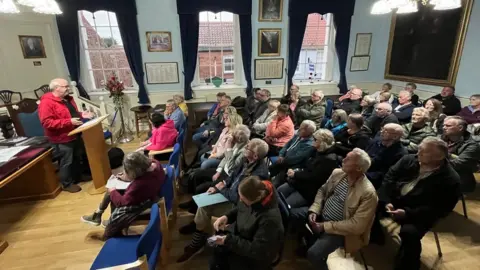 Keivn Shoesmith / BBC
Keivn Shoesmith / BBCThe government has committed to rolling out fibre broadband coverage across all of the UK by 2033.
Changes to the law since April 2022 mean operators can erect poles without having to apply to councils for planning permission.
Extra competition may help drive down bills, but it will mean telegraph poles being installed to carry cables where infrastructure-sharing agreements cannot be brokered.
BBC News visits Hedon in East Yorkshire, where the issue is further tangled by the area's unique telecoms history.
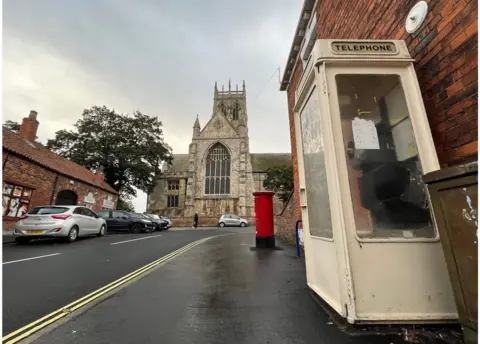 Kevin Shoesmith / BBC
Kevin Shoesmith / BBCIn Hedon Town Hall, battle lines were drawn; concerned residents determined to stop the advance of MS3 Networks.
Word had reached homeowners this local company, which has already installed poles in Hull, now has this Georgian market town in its sights, with installations scheduled to begin this week.
Many here are furious.
A campaign group calling itself Hedon Says No has been set up to discuss latest developments and tactics, with Thursday's meeting attended by about 50 residents.
I am told more than 900 people have now added their names to a pledge to boycott, for 10 years, any firm that makes use of newly-installed poles.
Tensions are high.
One resident, Julie Dervey, who is part of the campaign group, told me she feared her town was about "to look like 1940s Manhattan" with "a spider's web of wires strung between awful telegraph poles".
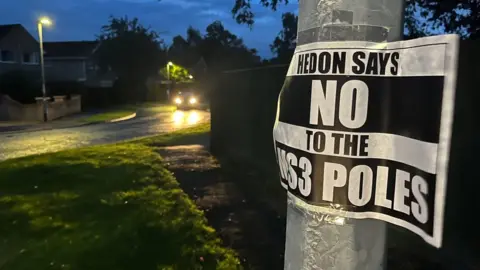 Kevin Shoesmith / BBC
Kevin Shoesmith / BBCShe reserved most of her scorn for MS3, but also blames the government, accusing it of bringing in legislation that has "left the door wide open" for broadband providers like MS3 to act, she claims, with impunity.
A 2013 amendment to the Electronic Communications Code 2003 (known as 'the Code') allows companies to install overhead cables if they choose, although not in conservation areas.
Ofcom, the UK's communications regulator, states competitors of Openreach - a BT-owned company that builds and runs the nation's broadband network - have used its infrastructure to roll out their own networks. This had "significantly reduced costs and disruption" and led to consumers being upgraded to faster services, it said.
Only there's a catch.
For almost 120 years, this part of the world has been served, almost exclusively, by its own telecoms company, Hull-based KCOM - famous for its trademark cream telephone boxes.
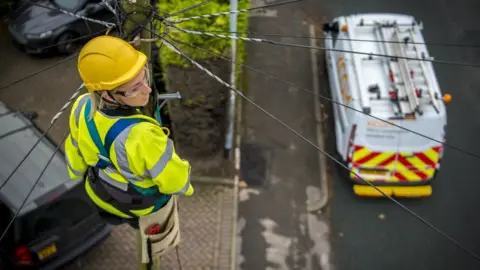 KCOM
KCOMIts full fibre Lightstream service now delivers speeds that have driven East Yorkshire to the top of broadband tables. KCOM has invested heavily in underground infrastructure, although it too has installed poles in the past.
Under Ofcom regulations, KCOM must provide access to its network and process applications quickly and thoroughly.
So why don't operators like MS3 simply pay KCOM the fee to use its infrastructure just as others have done with Openreach, negating the need to install more poles?
KCOM insisted its position is clear.
Though not naming any individual company, it said competitors either "don't follow the agreed application process through or simply don't apply in the first place". They then "erroneously blame KCOM for the inconvenience they are causing", the company said.
Furthermore, it confirmed it had received "no requests from any other provider for access to our infrastructure connecting properties in Cottingham, nor in other areas where this is an ongoing issue such as Hedon and Hessle".
It added: "Under the rules, we're only allowed to recover our costs for providing access and our quotes have never been queried.
"Where new providers are installing poles it's entirely their own commercial choice and not because they have not been able to gain access to our infrastructure on fair and reasonable terms.
"We sympathise with local residents who are having unpopular poles installed in their streets but unfortunately that's the decision of other providers and theirs alone."
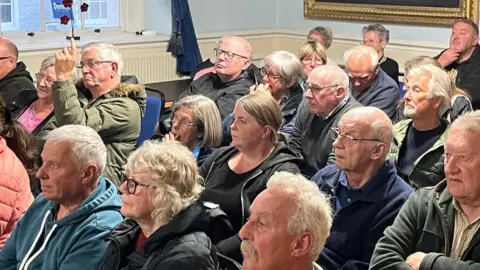 Kevin Shoesmith / BBC
Kevin Shoesmith / BBCGuy Miller, chief executive of MS3 Networks, has a different view.
He told me: "We have made multiple requests to KCOM to share infrastructure in other locations. Due to the costs involved and the time taken to process requests, it was deemed unviable to use this method to deploy our resources in Hedon and Hessle."
Mr Miller challenged KCOM to publish its "full price list" for sharing its infrastructure, and insisted MS3 was not "putting up poles for fun", adding the company "exists to provide competition and reduce people's bills in a cost of living crisis".
He said his company had already provided fibre broadband to 80,000 homes in Scunthorpe and Grimsby "using next to no new poles" by sharing Openreach's infrastructure.
 Getty Images
Getty ImagesAsked if he understood residents' concerns, Mr Miller said he appreciated "residents' pride" and "the minimum amount of poles" were being installed.
"In Hedon, we will look for alternative options [to poles], including going underground, in conservation areas," he said.
Mr Miller pledged "genuine concerns" would be taken into account when installing poles, but added: "Unfortunately, aesthetics is not a recognised reason for not deploying a pole as per the Code."
I asked him to list other towns MS3 had in its sights, with the BBC aware of signs having been put up in outlying villages, and he replied: "We don't publish that."
Mrs Dervey, who has lived in Hedon since 1984, said the general consensus among the Hedon Says No campaigners was that MS3 was choosing to install poles "because it's cheaper than laying underground cables".
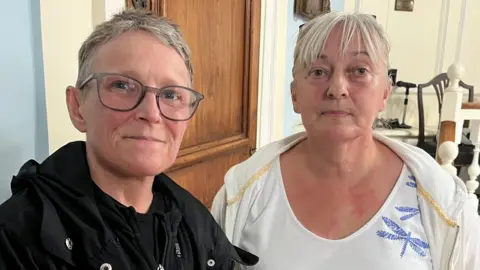 Kevin Shoesmith / BBC
Kevin Shoesmith / BBCIn response, Mr Miller accepted digging and installing its own infrastructure was the most expensive option. He added: "If we have to go underground in Hedon, we would leave it and it would stay a monopoly [in reference to KCOM being the dominant provider in East Yorkshire]."
Mrs Dervey insisted people generally welcomed more competition.
"Money is tight," she admitted. "We're happy for there to be competition but we do not want to see a load of poles all over our the town, especially in the newer estates where everything else is underground.
"We don't see why these new companies can't either form an agreement with KCOM or put in their own underground cables."
Chairing the public meeting, Councillor Steve Gallant, who sits on both Hedon Town Council and East Riding of Yorkshire Council, told residents: "When you change your gas or electricity supplier you don't get new pipes; it all comes the existing pipes and cables. The same should apply here."
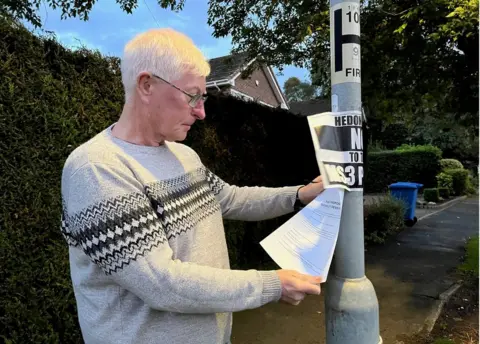 Kevin Shoesmith / BBC
Kevin Shoesmith / BBCAttached to a lamppost outside Steve Cutts' home is a notice from MS3 Networking informing residents a pole is to be installed "in this vicinity".
He said: "We don't need it. We don't want it. We've never been asked about it. We don't want this company in our town."
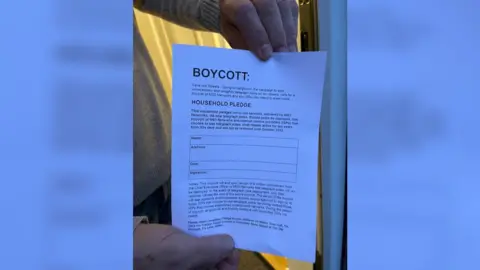 Kevin Shoesmith / BBC
Kevin Shoesmith / BBCHedon residents tell me they feel their concerns are well-founded after having watched poles being installed elsewhere.
Eileen Henderson lives within a conservation area in the nearby town of Hessle. This summer, MS3 installed a pole 10ft (3m) from her home, she said.
"MS3 told us KCOM weren't allowing them to share its underground cables so that's why the poles were needed," she said.
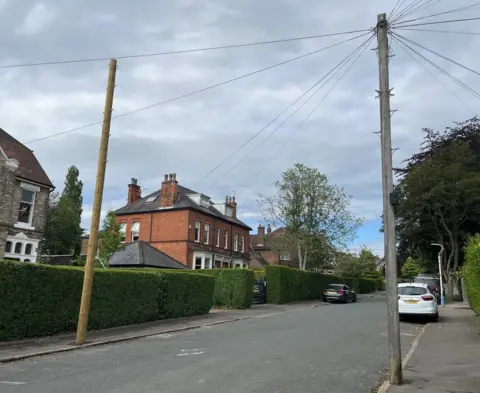 Richard Madden
Richard MaddenHull North MP Diana Johnson is one of a number of local MPs sympathetic to the campaigners.
She said: "KCOM and competing new companies such as MS3 and Connexin are squabbling over who can use existing infrastructure and who can put up large numbers of new poles the fastest.
"The poles are outdated, ugly and most residents don't want them cluttering their streets. Sometimes they've been put up in totally inappropriate places."
Last year, Ms Johnson drafted a private member's bill that would make local consultation mandatory on any telecoms infrastructure in residential areas, but she thinks there is a more local solution to "the telegraph poles debacle".
She said: "I am calling on the local network companies in Hull to do the decent thing and agree a shared code of conduct that gives local people their say on any future broadband installations."

 Ofcom
OfcomWhat does the regulator say?
In a statement, Ofcom said: "We're aware of concerns regarding the installation of broadband infrastructure in the Hull area. Planning laws are enforced by local authorities, and any changes to them would be a matter for Parliament.
"Under Ofcom regulations, KCOM must share its telegraph poles and underground ducts with rivals. In other parts of the UK, (BT's) Openreach's competitors have used its infrastructure to roll out their own networks. This has significantly reduced costs and disruption, and led to consumers being upgraded to faster services.
"Where competition has emerged in the Hull area, we've already seen lower prices. If KCOM's rivals don't think it's complied with its obligations, we would encourage them to bring a dispute to us. If effective competition doesn't emerge, we can consider strengthening our rules on KCOM."

Follow BBC East Yorkshire and Lincolnshire on Facebook, X (formerly Twitter), and Instagram. Send your story ideas to [email protected]
